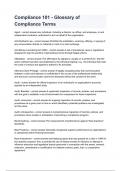Compliance 101 - Glossary of
Compliance Terms
Agent - correct answer-any individual, including a director, an officer, and employee, or and
independent contractor, authorized to act on behalf of the organization
Anti-Kickback Law - correct answer-Prohibits the solicitation, receiving, offering, or paying of
any remuneration directly or indirectly in cash or in kind exchange.
Anti-Money Laundering Act (AMI) - correct answer-A set of procedures, laws or regulations
designed to stop the practice of generating income through illegal actions.
Attestation - correct answer-The affirmation by signature, usually on a printed form, that the
action outlined has been accomplished by the individual signing; e.g., the individual has read
the code of conduct and agreed to adhere to its principles.
Attorney-Client Privilege - correct answer-A legally accepted policy that communication
between a client and attorney is confidential in the course of the professional relationship
and that such communication cannot be disclosed without the consent of the client.
Audit - correct answer-An official inspection of an individual's or organziation's accounts,
typically by an independent body.
Audit, Baseline - correct answer-A systematic inspection of records, policies, and procedures
with the goal to establish a set of benchmarks for comparison for future inspections
Audit, concurrent - correct answer-An ongoing inspection of records, policies, and
procedures at a given point in time in which identified p potential problems are investigated
as they arise
Audit, retrospective - correct answer-A comprehensive inspection of records, policies, and
procedures done usually in anticipation of launching a compliance program.
Benchmarking - correct answer-The measurement of performance against "best practices"
standards.
Best Practices - correct answer-Generally recognized superior performance by organizations
in operational and/or financial processes.
Byrd Amendment - correct answer-anti-lobbying statue that was passed as a rider in 1990 for
two specific purposes: first, to prohibit the use of federal monies to influence or attempt to
influence executive and legislative branch personnel in connection with the award, renewal,
extension, amendment or modification of a federal contract, grant, loan, or cooperative
agreement.
, Caremark International Derivative Litigation - correct answer-The 1996 U.S. civil settlement
of Caremark International, Inc. in which an imposed corporate integrity agreement precluded
Caremark from providing health care in certain forms for a period of five years.
CMPL - correct answer-The Civil Monetary Penalties Law authorizes the imposition of
substantial civil money penalties against an entity that engages in activities including, but not
limited to: (1) knowingly presenting or causing to be presented, a claim for services not
provided as claimed or which is otherwise false or fraudulent in any ...
Condoned - correct answer-individual knew of the offense and did not take reasonable steps
to prevent or terminate the offense
Corporate Integrity Agreement (CIG) - correct answer-Consent Decrees. A negotiated
settlement between a organization and the government in which the provider accepts no
liability but must agree to implement a strict plan of government-supervised corrective action.
Culpability Score - correct answer-Part of the U.S. Sentencing Commission guidelines for the
Sentencing of Organizations, a system that adds points for aggravating factors and subtracts
points for mitigating factors in the determination of fines imposed for fraud or abuse.
Discretionary Authority - correct answer-Legal power of the commissioner of Internal
Revenue to approve any classification of employees that does not discriminate in favor of a
prohibited group. Such approval is necessary before a retirement plan can be a qualified
pension plan and thus subject to tax benefits.
DOL - correct answer-To foster, promote, and develop the welfare of the wage earners, job
seekers, and retirees of the United States; improve working conditions; advance
opportunities for profitable employment; and assure work-related benefits and rights.
EEOC - correct answer-The U.S. Equal Employment Opportunity Commission (EEOC) is
responsible for enforcing federal laws that make it illegal to discriminate against a job
applicant or an employee because of the person's race, color, religion, sex (including
pregnancy, gender identity, and sexual orientation), national origin, age (40 or older),
disability or genetic information. It is also illegal to discriminate against a person because the
person complained about discrimination, filed a charge of discrimination, or participated in an
employment discrimination investigation or lawsuit.
Facilitation Payments - correct answer-small payments to government officials to expedite an
official act
False Claims Act (FCA) - correct answer-Originally adopted by the U.S. Congress in 1863
during the Civil War to discourage suppliers from overcharging the federal governments
,legislation that prohibits anyone from knowingly submitting or causing to be submitted a
false or fraudulent claim.
Family Education Rights and Privacy Act - correct answer-Federal legislation that protects
the privacy of students' personally identifiable information. The act applies to all educational
institutions that receive federal funds.




